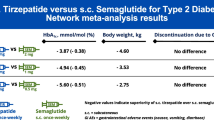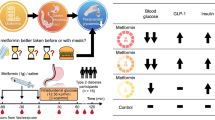Abstract
Diabetes and obesity have each become a national health crisis in recent years. The number of people who have diabetes and prediabetes continues to grow with a predicted number of 336 million people worldwide with type 2 diabetes by 2030. The prevalence of diabetes has risen in parallel with the increased prevalence of obesity. The optimal nutrition therapy for the treatment of both diabetes and obesity remains controversial. Health care practitioners are no longer solely prescribing the conventional low-fat, higher-carbohydrate diet approach that was used for over a decade. Lower-carbohydrate, higher-fat, or higher-protein diets are now being viewed as equally or sometimes more effective treatment plans for diabetes and obesity. In addition, there are other aspects of diet beyond macronutrient composition that are currently being investigated. This article will summarize research conducted over the past 2 years examining medical nutrition therapy for diabetes and obesity. It will also describe the unique challenges that come with treating this patient population.
Similar content being viewed by others
References
Papers of particular interest, published recently, have been highlighted as: • Of importance
Ben-Avraham S, Harman-Boehm I, Schwarzfuchs D, Shai I. Dietary strategies for patients with type 2 diabetes in the era of mutli-approaches; review and results from the Dietary Intervention Randomized Controlled Tri al (DIRECT). Diabetes Research and Clinical Practice 2009;86:S41–48.
Centers for Disease Control. CDC 2007 diabetes fact sheet. Available at www.cdc.org.
Dansinger M, Augustin Gleason J, Griffith J et al. Comparison of the Atkins, Ornish, Weight Watchers, and Zone Diets for Weight Loss and Heart Disease Risk Reduction. JAMA 2005;293:43-53.
• Sacks F, Bray G, Carey V et al. Comparison of Weight-Loss Diets with Differing Compositions of Fat, Protein, and Carbohydrates. NEJM 2009;360(9):859-873. This study shows the results of different diet approaches for obesity at the end of 2 years. Most studies of nutrition management of obesity do not extend beyond 1 year. This study also contained a large sample size.
• The Look AHEAD Research Group. Long-Term Effects of a Lifestyle Intervention on Weight and Cardiovascular Risk Factors in Individuals with Type 2 Diabetes Mellitus. Arch Intern Med 2010;170;17:1566-1574. This study shows the longest duration of weight loss and uses a low-fat, higher-carbohydrate diet and meal replacements for the intervention group.
• Foster G, Wyatt H, Hill J et al. Weight and Metabolic Outcomes After 2 Years on a Low-Carbohydrate Versus Low-Fat Diet. Annals of Internal Medicine 2010;153(3):147-157. This study also looks at different diet approaches for obesity and also has data extending out 2 years and was conducted over three academic medical centers.
Davis, N, Tomuta N, Schechter C et al. Comparative Study of the Effects of a 1-Year Dietary Intervention of a Low-Carbohydrate Diet Versus a Low-Fat Diet on Weight and Glycemic Control in Type 2 Diabetes. Diabetes Care 2009 Jul;32(7):1147–52
Hession M, Rolland C, Kulkarni U et al. Systematic review of randomized controlled trials of low-carbohydrate vs low-fat/low-calorie diets in the management of obesity and its comorbidities. Obesity Reviews 2009;10:36–50.
Haimoto H, Sasakabe T, Wakai K, Umegaki H. Effects of a low-carbohydrate diet on glycemic control in outpatients with severe type 2 diabetes. Nutrition and Metabolism 2009;6:21
Delbridge E, Prendergast L, Pritchard J, Proietto J. One-year weight maintenance after significant weight loss in healthy overweight and obese subjects: does diet composition matter? American Journal of Clinical Nutrition 2009;90:1203–1214.
Bradley U, Spence M, Courtney CH et al. Low-Fat Versus Low-Carbohydrate Weight Reduction Diets: Effects on Weight Loss, Insulin Resistance, and Cardiovascular Risk: A Randomized Control Trial. Diabetes 2009;58:2741–2748.
Papakonstantinou E, Triantafillidou D, Panagiotakos DB et al. A high-protein low-fat diet is more effective in improving blood pressure and triglycerides in calorie-restricted obese individuals with newly diagnosed type 2 diabetes. European Journal of Clinical Nutrition 2010;64:595–602.
Kodama S, Saito K, Tanaka S et al. Influence of Fat and Carbohydrate Proportions on the Metabolic Profile in Patients with Type 2 Diabetes; A Meta Analysis. Diabetes Care 2009;32(5):959–965.
Joslin Diabetes Center and Joslin Clinic : Clinical Nutrition Guidelines for Overweight and Obese Adults with Type 2 Diabetes, Pre-diabetes or Those at High Risk for Developing Type 2 Diabetes. Available at www.joslin.org. Updated March 2007.
Giusti J, Rizzotto JA. Interpreting the Joslin Diabetes Center and Joslin Clinic Clinical Nutrition Guideline for Overweight and Obese Adults With Type 2 Diabetes. Curr Diab Rep 2006;6(5):405–8.
Campbell A. Tackling “diabesity” head-on. Joslin Diabetes Center’s new nutrition guideline. Diabetes Self Management 2005;22(6):40, 42–4.
Hamdy O, Carver C. The Why WAIT program: improving clinical outcomes through weight management in type 2 diabetes. Curr Diab Rep 2008 ;8(5):413–20
Wycherley T, Noakes M, Clifton P et al. A High-Protein Diet With Resistance Exercise Training Improves Weight Loss and Body Composition in Overweight and Obese Patients with Type 2 Diabetes. Diabetes Care. 2010 May;33(5):969–76.
Layman D, Evans E, Erickson D et al. A Moderate-Protein Diet Produces Sustained Weight Loss and Long-Term Changes in Body Composition and Blood Lipids in Obese Adults. Journal of Nutrition 2009;10:514–521.
Pimentel G, Portero-Mclellan K, Oliveira E et al. Long-term nutrition education reduces several risk factors for type 2 diabetes mellitus in Brazilians with impaired glucose tolerance. Nutrition Research 2010;30:186–190.
Barnard N, Cohen J, Jenkins D et al. A low-fat vegan diet and a conventional diabetes diet in the treatment of type 2 diabetes: a randomized, controlled, 74-wk clinical trial. American Journal of Clinical Nutrition 2009;89(supp):1588S–1596S.
Wolfram T, Ismail-Beigi F. Efficacy of diets containing high amounts of fiber in the management of type 2 diabetes. Endocrine Practice 2010:1-27
Thomas D, E Elliot. Low glycaemic index, or low glycaemic load, diets for diabetes melliltus. Cochrane Database Syst Rev 2009;21:CD006296.
Hamdy O, Zweifelhofer D. Weight Management Using a Meal Replacement Strategy in Type 2 Diabetes. Current Diabetes Reports 2010;10:159–164.
Fletchner-Mors M, Ditschuneit H, Johnson T et al. Metabolic and Weight Loss Effects of Long-Term Dietary Intervention in Obese Patients: Four Year Results. Obesity Research 2000;8(5):399–402.
Ashley J, Herzog H, Clodfelter S et al. Nutrient adequacy during weight loss interventions: a randomized study in women comparing the dietary intake in a meal replacement group with a traditional food group. Nutrition Journal 2007;6:12.
Rock C, Flatt S, Sherwood N et al. Effect of a Free Prepared Meal and Incentivized Weight Loss Program on Weight Loss and Weight Loss Maintenance in Obese and Overweight Women. JAMA 2010;0(2010):201015031-9.
Mitri J, Hamdy O. Diabetes medications and body weight. Expert Opinion Drug Safety 2009 ;8(5):573–84.
Disclosure
No potential conflicts of interest relevant to this article were reported.
Author information
Authors and Affiliations
Corresponding author
Rights and permissions
About this article
Cite this article
Arathuzik, G.G., Goebel-Fabbri, A.E. Nutrition Therapy and the Management of Obesity and Diabetes: An Update. Curr Diab Rep 11, 106–110 (2011). https://doi.org/10.1007/s11892-011-0176-0
Published:
Issue Date:
DOI: https://doi.org/10.1007/s11892-011-0176-0




